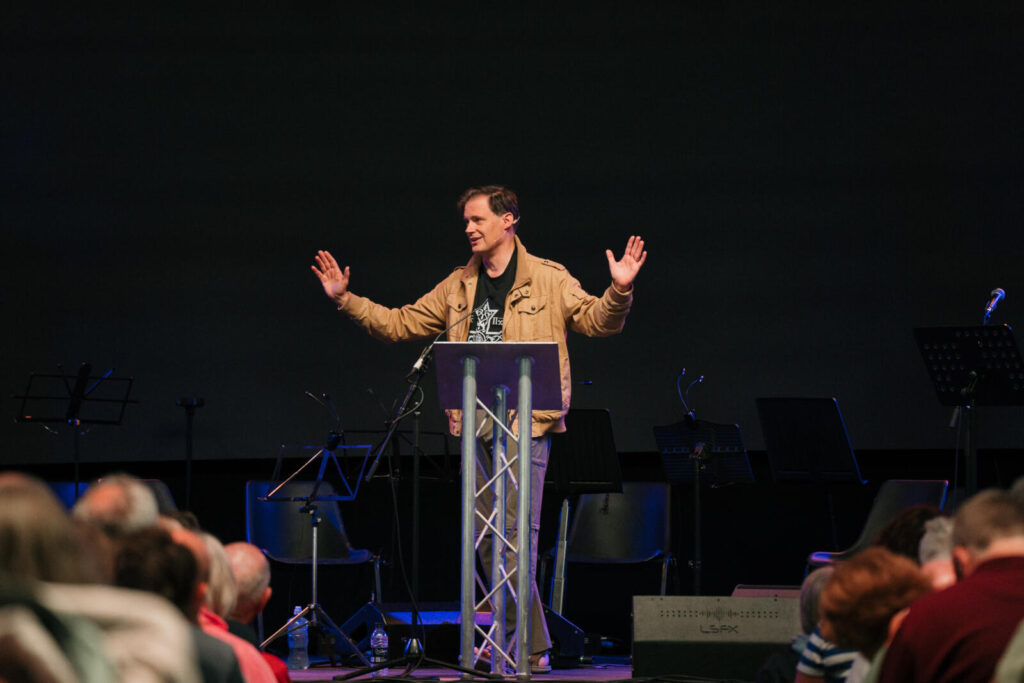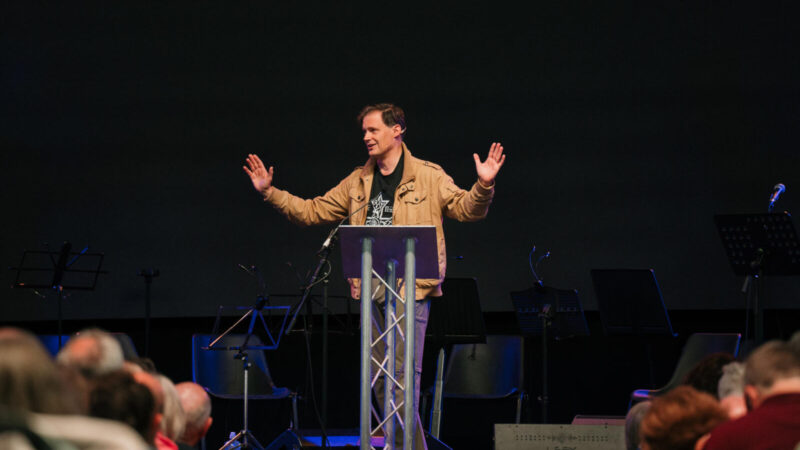Tuesday 6 August
Dr Peter J. Williams is the Principal and CEO of Tyndale House, Cambridge. He was educated at the University of Cambridge, where he received his MA, MPhil, and PhD in the study of ancient languages related to the Bible. He has been leading Tyndale House since 2007 and is also an Affiliated Lecturer in the Faculty of Divinity in the University of Cambridge, Chair of the International Greek New Testament Project and a member of the Translation Oversight Committee of the English Standard Version of the Bible. Here is a summary of his message on Tuesday morning brought to you by the New Horizon media team.

Jesus stories are like jewels on a necklace. They all occur in a book which is in the context of the death and resurrection of our Lord and saviour.
The Setting
Luke chapter 10 Jesus begins with His biggest ever mission. He sends out lots of disciples two by two. He also tells them that they are going out as sheep amongst wolves. He says take the very first hospitality that you get – we should not be trying to get a better deal but accept the hospitality as it comes.
Then in v10 – 16 He talks about the woes of the places that do not accept the message. In v13-14 Chorazin! and Bethsaida– those who are close, those religious villages that are thoroughly orthodox in faith are rejecting the message even though Tyre and Sidon would accept it.
The disciples return and they are happy about their success. But Jesus explains what He is really happy about. I’m thankful that you’ve hidden the truth of the kingdom from those who seem wise ad reveal it to ordinary people. And then just after Jesus has said that those who are wise don’t understand and the simple people do, then along comes a great intellect.
This is followed by an amazing story about someone giving practical help but immediate after this comes the story of Mary and Martha. Martha is doing the practical preparations and Mary has chosen the better part – sitting and learning at the feed of Jesus. You could easily come away from the Good Samaritan and think that everybody should be out helping others. But then there is the balance in the story of Mary and Martha. Jesus does not elevate intellectualisation or practical service but balances the two.
The lawyer asks a question (what must I do to inherit eternal life?) and Jesus comes back with a counter question. Then He gives a statement and a challenge (go and do likewise). This same pattern is repeated in verses 29, 36 and 37) question, counter question, statement and challenge.
We have a Jewish legal expert. He knows the Bible really well but he has corrupt motives. It says he stands up to test Jesus. An intellectual is in front of the best teacher in the world. He has finally met someone cleverer than he is. He has an opportunity to learn. But he combines intellect with being a spiritual ignoramus.
He gives a perfect answer to Jesus’ counter question. His intellect is one hundred percent but his attitude is zero. Jesus says, “This do and live.” It implies that the man hasn’t been doing this. He sets the lawyer the example of perfect obedience. If you reflect on this, you should realise that you fall short. You cannot inherit eternal life by doing things.
“This do and live” – there is only one other place in the Bible where this phrase occurs. Genesis 42:18 Joseph tells this to his brothers. It was said by the victim to those who had wronged him. The Bible expert doesn’t spot the connection so he ploughs on. He desires to justify himself. How often do we do the same? You want to prove yourself right. You want to win the argument.
He goes for the easier of the two commandments. Who is my neighbour? This is a ploy – niggling about the meaning of words. Pilate did this same thing (what is truth?). Jesus does not play intellectual games. This man is trying to get Jesus entangled in a question of who is my neighbour.
The Story
Jesus answers with a story – 105 words – utterly powerful. One of the most amazing stories ever told. In the opening line, Jesus shows local knowledge. There is a common road between Jerusalem and Jericho and it goes down. The knowledge of geography in the gospel is completely right for eyewitness. This story has to come from the land. You could not be in another land and know this information. It is a winding road and there are lots of places for robbers to hide. This man is brutally attacked and he is left half dead with multiple wounds.
Now there is some good news. A priest is coming past. He is going away from work on his way to Jericho. He is probably ritually clean and is travelling in the same direction as the man but he does not get involved. Why doesn’t he help? There are so many reasons why he might not help. He may be busy. He may be running late. He might get attacked. If he touches a dead body, he might make himself unclean. There are so many reasons for not helping but it doesn’t matter at all. The end result was that he did not help.
Then along comes a Levite. And another religious leader fails to act. They both claim attachment to the word of God. They both would have to teach things like “love your neighbour” – so why don’t they do it? They must have some system of rationalisation so they don’t do it.
Then along comes a Samaritan and before we see his response, we see his emotional response – compassion. It comes from within. He binds the wounds and pours in oil and wine. This is what he has with him. He uses normal stuff to help. It was what he had available.
There is a similar story in the Old Testament. 2 Chronicles 28: 15 This is the story of where Israel and Judah had been at war and Israel had taken 200,000 people captives. “The men designated by name took the prisoners, and from the plunder they clothed all who were naked. They provided them with clothes and sandals, food and drink,and healing balm. All those who were weak they put on donkeys. So they took them back to their fellow Israelites at Jericho, the City of Palms, and returned to Samaria.”
Jesus knows the bible rather well – better than this lawyer. We can see how much of the Old Testament is weaved into Jesus stories. This man gives the innkeeper two denarii. He is a super normal Samaritan. He does his kindness at his own expense. Meanwhile the priest and the Levite who knew the command, did nothing. They represent orthodox religion while the Samaritan represents heretical religion.
The person with the wrong theology was doing the right thing and the people with the right theology were doing the wrong thing.
Then Jesus turns around with the counter question… which of these proved to be a neighbour to the man who was attacked. It is a double challenge not only to love like the Samaritan but to love the Samaritan. The lawyer cannot even bring himself to say “the Samaritan” – instead he says, iut is the one who did the kind thing.
The Significance
Some people see this as an allegory for Christ. That doesn’t really work. If you make us the man in the road, we are dead in our sins not half dead and Jesus was a Jew not a Samaritan. Jesus tells this story in a gospel way but we cannot align the characters perfectly.
How do we retell this story for today. It can be retold. We tell of different ethnic groups. Palestinian and Israeli. Ukrainian and Russian. How would we re-tell it? A church leader, a missionary and a Muslim immigrant?
The point is, across divides we need to show uncomfortable love. It is not just across ethnicities but also political divides and theological divides. There is hypocrisy on every side. Every country ethnicity, political group. There is only one righteous one – Jesus Christ. He is the only one who has truly fulfilled the great commandments (loving God and loving his neighbour).
This story is also about how we try to justify ourselves. How much of our time do we spend arguing about words? When God’s standard is 100% (to love the Lord our God with all our heart, soul, mind and strength). Because of Christ’s love for us, that miracle of our own love for Him is growing. He is turning us away from the natural selfishness we have as humans but because of his love for us and through the sanctifying work of the Spirit, He is working in us a love for Him and for others.
Who should we love first? We need to start with our love for God and that should energise us and inspire us to love those who are our neighbours.
We have an amazing gospel opportunity right now. There is so much fake love in the world. There is not a lot of the real stuff. When your neighbours see real love, they know what is missing. Lots of people don’t seem to have the answers. Politicians don’t’ have the answer. We do in the gospel of Jesus Christ. We also have the love of Christ. That’s when people see, this is real.
I spoke to a Hungarian friend after the Russian invasion of Ukraine. The churches had welcomed people but some charity folks turned up at the border for camera shoots and then went away. Some people set up fake Go Fund Me accounts to cash in. We have an opportunity to show genuine, authentic love.
We have the gospel. We have this amazing solution. People need the good news of Jesus Christ. Changing people one life at a time. Not trying to impose solutions. We have an opportunity this year. The harvest is great, the labourers are few.
What an amazing position to be. You see how new atheism is beginning to look shaky. They realise that they don’t have the answers. And we have the gospel. As we look to serve those around us, with the best news ever. Not trying to offer a superficial solution but one that comes from the heart.
